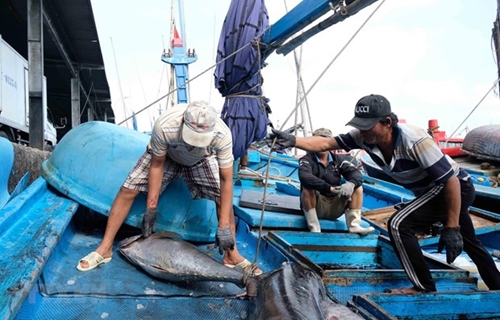October 27, 2020 | 17:46 (GMT+7)
ASEAN Today: Vietnam lauded for efforts to combat illegal fishing
ASEAN Today, a website based in Singapore, on October 26 ran an article entitled “Vietnam lauded for efforts to combat illegal fishing,” hailing the country’s efforts in this sphere.
The article quoted Vice Chairman of the Spanish Chamber of Commerce in Vietnam Rubén Saornil Mínguez as saying at a conference in Khanh Hoa province that the country had made significant improvements on the issue in recent years.
Rubén noted that as part of its reforms, Vietnam has raised standards throughout the fishing industry to comply with regulations for EU export under the EU-Vietnam Free Trade Agreement (EVFTA).
    |
 |
|
Fishermen in Khanh Hoa province |
In line with EC recommendations, Vietnam adopted a new Fisheries Law in 2017, including a framework for building sustainable aquaculture and fisheries development. The government also established a steering committee for illegal, unreported and unregulated (IUU) fishing prevention at the national level - the move is aimed at supporting thorough enforcement of fisheries laws.
New regulations also require that all fishing vessels carry tracking devices. It appears that the regulations may already be helping to improve seafood traceability, as the number of boats with on-board GPS or other tracking technology has increased from 56 percent in April to 81 percent as of late August. These steps to improve traceability in aquatic product supply chains have been recognized internationally as well.
The article wrote that these efforts on transparency and governance are part of Vietnam’s new master plan for aquatic resources management. The plan also reportedly includes programs to ensure all fishing vessels comply with regulations and initiatives to develop fisheries sustainably and responsibly.
Public programs are also helping some producers convert their business to processed products. This offers producers more flexibility, allows them to sell products online and insulates them from economic shocks.
Vietnam is currently the third-largest seafood exporter in the world, shipping 8.6 billion USD worth of fisheries products in 2019. But the country has seen a decline in fisheries shipments amid the COVID-19 pandemic. In the first half of 2020, the country's fisheries exports fell 8.6 percent compared to the same period last year. By the end of August, shipments had picked up again, shrinking the year-on-year drop to 5.3 percent.
Source: VNA